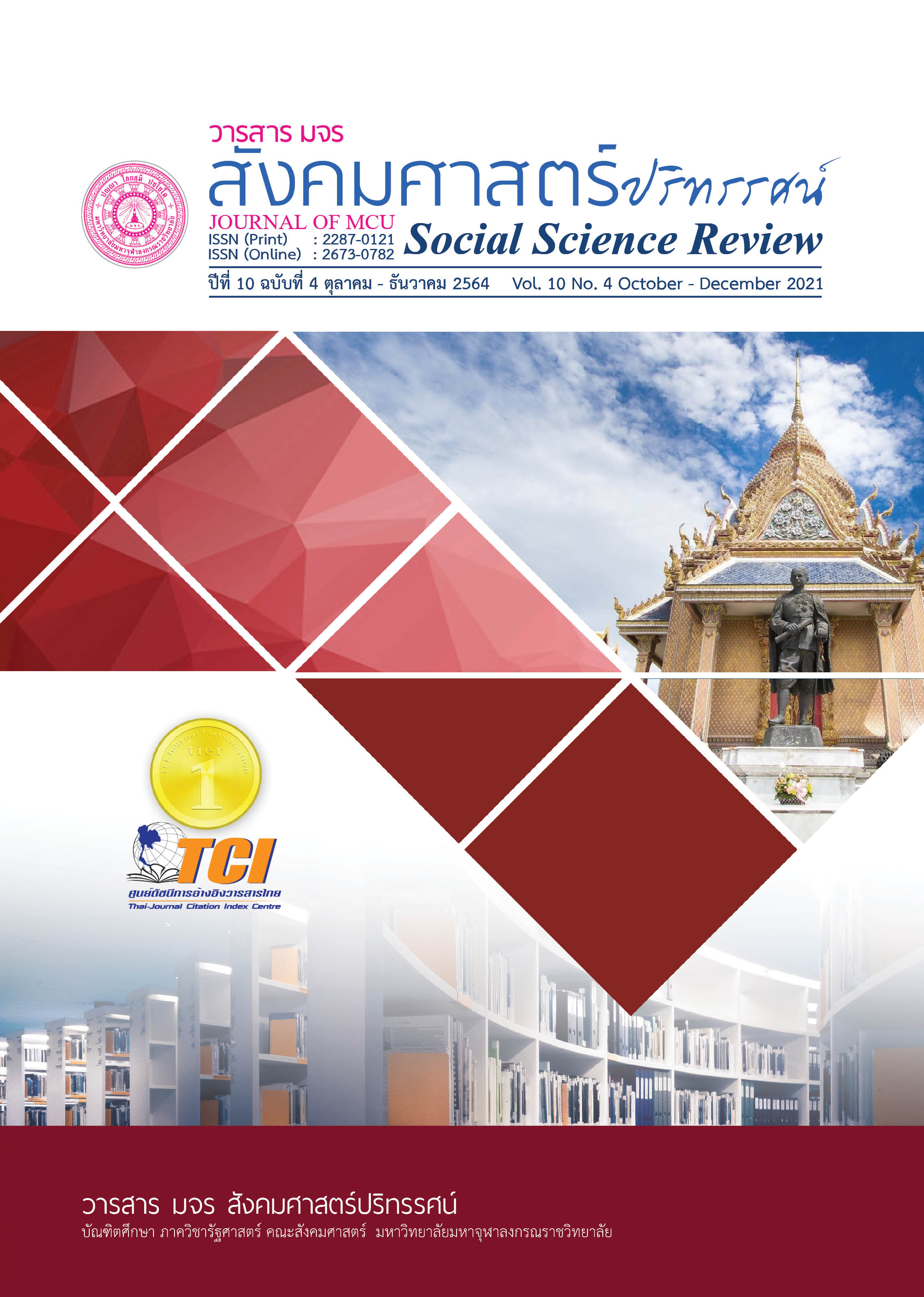ตัวแบบ (โมเดล) ความสัมพันธ์เชิงสาเหตุการวางแผนแนวทางในระยะยาว ของสัญญาการบริการรถบรรทุกในประเทศไทย
คำสำคัญ:
สัญญาการบริการ, การจัดการ, การวางแผนกลยุทธ์บทคัดย่อ
บทความวิจัยนี้มีวัตถุประสงค์เพื่อ 1) ศึกษาปัจจัยที่มีผลต่อการวางแผนแนวทางในระยะยาวของสัญญาการบริการรถบรรทุกในประเทศไทย 2) พัฒนาตัวแบบความสัมพันธ์เชิงสาเหตุการวางแผนแนวทางในระยะยาวของสัญญาการบริการรถบรรทุกในประเทศไทย 3) เพื่อตรวจสอบความตรงของตัวแบบกับข้อมูลเชิงประจักษ์ และอิทธิพลทางตรงและทางอ้อมต่อการวางแผนแนวทางในระยะยาวของสัญญาการบริการรถบรรทุกในประเทศไทย แบบผสานวิธี ได้แก่ การวิจัยเชิงคุณภาพ สัมภาษณ์ข้อมูลเชิงลึกสำคัญกับผู้ประกอบการรถบรรทุก 10 คน การวิจัยเชิงปริมาณ กลุ่มตัวอย่าง 400 คน เครื่องมือวิจัยคือ แบบสัมภาษณ์และแบบสอบถาม วิเคราะห์ข้อมูลเชิงคุณภาพใช้การวิเคราะห์เนื้อหาและข้อสรุปแบบอุปนัย วิเคราะห์ข้อมูลเชิงปริมาณใช้สถิติเชิงบรรยาย วิเคราะห์สหสัมพันธ์เพื่อตรวจสอบความตรงของตัวแบบและขนาดอิทธิพลทางตรงทางอ้อมด้วยโปรแกรมสำเร็จรูปทางสังคมศาสตร์
ผลการวิจัยพบว่า 1) ปัจจัยที่สัมพันธ์ต่อปัจจัยที่มีผลต่อการวางแผนแนวทางในระยะยาวประกอบด้วย ความสามารถในการออกแบบสัญญา ความเฉพาะเจาะจงของสัญญาและความซับซ้อนของสัญญา 2) ตัวแบบที่พัฒนาขึ้นประกอบด้วยตัวแปรแฝงภายนอกคือ ความสามารถในการออกแบบสัญญาและตัวแปรแฝงภายในคือ ความเฉพาะเจาะจงของสัญญา ความซับซ้อนของสัญญาและการวางแนวทางในระยะยาว 3) ตัวแบบเป็นการศึกษาความสัมพันธ์ระหว่างผู้ประกอบการรถบรรทุกกับศูนย์บริการที่มีความซับซ้อนโดยพิจารณาจากสัญญาการบริการเป็นตัวแปรส่งผ่านและพบว่า ตัวแบบสัญญาการบริการมีความสอดคล้องกลมกลืนกับข้อมูลเชิงประจักษ์
เอกสารอ้างอิง
Ahmad, S., & Butt, M.M. (2012). Can after sale service generate brand equity?. Marketing Intelligence and Planning, 30(3). 307-323.
Argyres, N., & Mayer, K. J. (2007). Contract design as a firm capability: An integration of learning and transaction cost perspectives. Academy of management review, 32(4), 1060-1077.
Bagheri, et al. (2014). Business-IT alignment in PSS value networks: a capability-based framework. Paper presented at the Working Conference on Virtual Enterprises.
Chen, M., et al. (2017). Interaction of after-sales service provider and contract type in a supply chain. International Journal of Production Economics, 193, 514-527.
Cho, M., et al. (2019). Interaction effects between contract specificity, competence trust and goodwill trust upon supplier opportunism and relational stability: A focus upon restaurant performance. International Journal of Contemporary Hospitality Management.
Dombrowski, U., & Malorny, C. (2017). Service planning as support process for a Lean After Sales Service. Procedia CIRP, 64, 324-329.
Fraser, K., et al. (2013). TQM in new car dealerships: a study from the firms’ perspective. The TQM Journal, 25 (1), 5-17.
George N., et al. (2017). Aligning customer requirements and organizational constraints to service processes and strategies. Business Process Management Journal, 23(5), 1018-1042.
Hedvall, K., et al. (2016). Analyzing an activity in context: A case study of the conditions for vehicle maintenance. Industrial Marketing Management, 58, 69-82.
Hezarkhani, B., et al. (2019). Optimal Design of Uptime-Guarantee Maintenance Contracts. Retrieved March 20, 2020, from https://www.researchgate.net/publication/334036285_Optimal_Design_of_Uptime-Guarantee_Maintenance_Contracts
HF, K. J. P. (1974). An index of factor simplicity. 39, 31-36.
Jacob, F., & Ulaga, W. (2008). The transition from product to service in business markets: An agenda for academic inquiry. Industrial Marketing Management, 37(3), 247-253.
Lawsirirat, C. (2007). Creating optimal service delivery strategy of long-term service agreements from risk management perspective. (Doctor of Philosophy), Rensselaer Polytechnic Institute.
Levin, R. C.Klevorick, et al. (2013). Appropriating the returns from industrial research and development. Competition policy international, 9(2), 160-196.
Lumineau, F. (2017). How contracts influence trust and distrust. Journal of management, 43(5), 1553-1577.
Makarova, I. K., et al. (2016). Improving the logistical processes in corporate service system. Transport problems, 11(1), 1-15.
Niwas, R. (2018). Reliability Analysis of a Maintenance Scheduling Model Under Failure Free Warranty Policy. Reliability: Theory Applications, 13(3 (50)).
Oliva, R., & Kallenberg, R. (2003). Managing the transition from products to services. International journal of service industry management, 160 - 172.
Parida, V. S., et al. (2015). Developing global service innovation capabilities: How global manufacturers address the challenges of market heterogeneity. Research-Technology Management, 58(5), 35-44.
Reuer, J. J., & Ariño, A. (2007). Strategic alliance contracts: Dimensions and determinants of contractual complexity. Strategic Management Journal, 28(3), 313-330.
Saccani, N., et al. (2014). Investigating the linkages between service types and supplier relationships in sterilized environments. International Journal of Production Economics. 149, 226-238.
Salmasnia, A., & Baratian, M. (2020). Optimization of maintenance policy under warranty length‐based demand with consideration of both manufacturer and buyer satisfaction. Applied Stochastic Models in Business Industry. 1-18.
Shafiee, M., & Chukova, S. (2013). Maintenance models in warranty: A literature review. European Journal of Operational Research, 229(3), 561-572.
Shen, L. S., et al. (2019). Contract design capability as a trust enabler in the pre-formation phase of interfirm relationships. Journal of Business Research, 95, 103-115.
________. (2020). Between contracts and trust: Disentangling the safeguarding and coordinating effects over the relationship life cycle. Industrial Marketing Management, 84, 183-193.
Shin, J. H., & Jun, H. B. (2015). On condition-based maintenance policy. Journal of Computational Design and Engineering, 2(2), 119-127.
Taylor, A. (2005). An operations perspective on strategic alliance success factors: An exploratory study of alliance managers in the software industry. International Journal of Operations & Production Management. Retrieved March 20, 2020, from https://www.researchgate.net/publication/241686806_International_Journal_of_Operations_Production_Management_Learning_on_lean_a_review_of_thinking_and_research
Tayyeb, H. (2021). Contract Design and Related Agreements. In Innovative and Agile Contracting for Digital Transformation and Industry 4.0 (pp. 40-61): IGI Global.
Vlaar, P. W., et al. (2006). Coping with problems of understanding in interorganizational relationships: Using formalization as a means to make sense. Organization Studies, 27(11), 1617-1638.
Wezter, M. G., et al. (2012) Maintenance, repair and overhaul management. Washington, DC Patent No. 8,266,066. U.S. Patent and Trademark Office.
Yamane, T. (1973). Statistics: An introduction analysis. Harper & Row.
ดาวน์โหลด
เผยแพร่แล้ว
รูปแบบการอ้างอิง
ฉบับ
ประเภทบทความ
สัญญาอนุญาต
ลิขสิทธิ์ (c) 2021 วารสาร มจร สังคมศาสตร์ปริทรรศน์

อนุญาตภายใต้เงื่อนไข Creative Commons Attribution-NonCommercial-NoDerivatives 4.0 International License.
เพื่อให้เป็นไปตามกฎหมายลิขสิทธิ์ ผู้นิพนธ์ทุกท่านต้องลงลายมือชื่อในแบบฟอร์มใบมอบลิขสิทธิ์บทความให้แก่วารสารฯ พร้อมกับบทความต้นฉบับที่ได้แก้ไขครั้งสุดท้าย นอกจากนี้ ผู้นิพนธ์ทุกท่านต้องยืนยันว่าบทความต้นฉบับที่ส่งมาตีพิมพ์นั้น ได้ส่งมาตีพิมพ์เฉพาะในวารสาร มจร สังคมศาสตร์ปริทรรศน์ เพียงแห่งเดียวเท่านั้น หากมีการใช้ภาพหรือตารางหรือเนื้อหาอื่นๆ ของผู้นิพนธ์อื่นที่ปรากฏในสิ่งตีพิมพ์อื่นมาแล้ว ผู้นิพนธ์ต้องขออนุญาตเจ้าของลิขสิทธิ์ก่อน พร้อมทั้งแสดงหนังสือที่ได้รับการยินยอมต่อบรรณาธิการ ก่อนที่บทความจะได้รับการตีพิมพ์ หากไม่เป็นไปตามข้อกำหนดเบื้องต้น ทางวารสารจะถอดบทความของท่านออกโดยไม่มีข้อยกเว้นใดๆ ทั้งสิ้น





